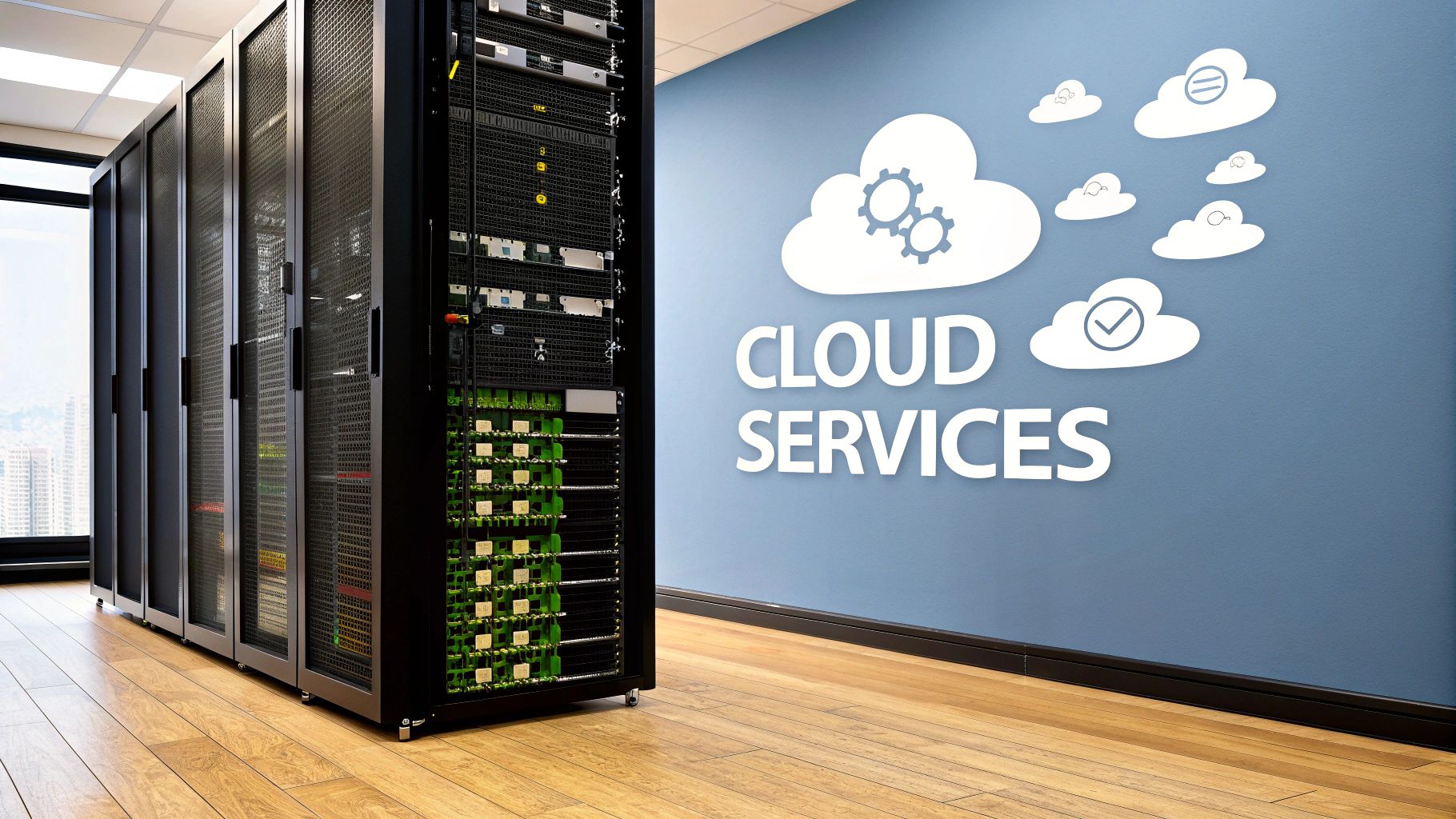Stripped down to its core, managed IT services simply means handing over the reins of your company's technology to a specialist firm. This partner, known as a Managed Service Provider (or MSP), takes on the day-to-day running of everything from your cybersecurity and network health to data backups and helping your team with their IT niggles, all for a predictable monthly fee.
What Are Managed IT Services? An Analogy
Let's try a simple analogy. Say you run a business that relies on a fleet of delivery vans. You have two choices. You could hire your own team of mechanics, buy all the specialised tools, and run your own garage to manage servicing and repairs. That's your classic in-house IT model.
Or, you could partner with a specialist garage. They handle all the maintenance, MOTs, and emergency repairs for a set monthly cost. Crucially, they don't just sit around waiting for a van to break down; they're constantly servicing the fleet to stop problems from happening in the first place, making sure your business keeps moving.
That’s exactly how managed IT services work for your technology. Instead of the headache and expense of building an internal IT department, you partner with an MSP. This external team of experts takes full, proactive responsibility for your entire IT setup.
From Reactive Fixes to Proactive Partnerships
The old way of doing IT support was called "break-fix". Something would go wrong, you’d call for help, and then you'd face downtime and a surprise bill. It was a purely reactive relationship. Managed services completely flip that on its head. An MSP’s main job is to prevent problems before they can ever disrupt your business.
A true managed services partnership is about strategic alignment. The provider’s success is directly tied to your stability and efficiency, creating a relationship built on preventing downtime, not profiting from it.
This proactive mindset is what turns managed IT from a simple cost into a real strategic asset. The focus shifts from just fixing broken computers to fine-tuning your entire technology ecosystem for better performance, security, and growth.
A Rapidly Growing Market in the UK
This move towards outsourcing isn't just a fleeting trend; it's a major strategic shift for businesses across the UK. With the ever-growing complexity of modern IT – think cloud computing and sophisticated cyber threats – it's become incredibly difficult for most companies to manage everything effectively on their own.
The numbers tell the story. The UK managed IT services market was valued at around £15.35 billion in 2023 and is on track to nearly double to £28.29 billion by 2032. This explosive growth shows just how many businesses are turning to MSPs to stay competitive and keep costs under control. You can dig deeper into the data on why managed services are essential for UK businesses in 2025.
Ultimately, this kind of partnership allows you to offload the technical burden, safe in the knowledge that a team of specialists is keeping your systems humming along. It frees you and your staff up to concentrate on what you do best—running and growing your business.
The Core Services Inside a Managed IT Plan
So, what do you actually get when you sign up for managed IT services? A proper plan is far more than just having an IT person on speed dial; it’s a whole suite of services working in harmony to keep your business running smoothly, securely, and efficiently. It’s best to think of it as a multi-layered support system for your entire technology setup.
The heart of any good plan is proactive monitoring and maintenance. Instead of waiting for something to break, your Managed Service Provider (MSP) uses specialised tools to keep a watchful eye on your systems 24/7. They spot the early warning signs—a server running hot, a hard drive nearing its limit, or unusual network activity—and step in to fix things before they can disrupt your business.
This constant vigilance is what prevents that expensive downtime that brings everything to a grinding halt. It’s the difference between a mechanic giving your car a regular service to keep it reliable and waiting for the engine to blow on the M1.
Network Management and Cybersecurity
Your network is the central nervous system of your business. It connects your team, your data, and your customers. An MSP handles the complex job of managing this network, making sure it’s stable, fast, and, most importantly, secure. This involves everything from managing routers and switches to ensuring your Wi-Fi is reliable for everyone on staff.
Even more critical these days is the cybersecurity piece. Cyber threats are more common and clever than ever, which means having a dedicated defence isn't just a 'nice to have' anymore.
A managed service provider acts as your first line of defence, implementing robust security measures to protect your valuable data and reputation from attacks.
Here’s what that typically includes:
- Firewall Management: Setting up and maintaining a strong digital barrier to block unauthorised access.
- Antivirus and Anti-Malware: Deploying and constantly updating software across every company device to catch malicious code.
- Email Security: Filtering out phishing scams, spam, and dangerous attachments before they ever land in your team's inboxes.
These elements work together to build a secure environment where your business can operate with confidence. The many interconnected managed IT services benefits really do start with this strong security foundation.

Data Backup and Disaster Recovery
Let’s ask a tough question: what would happen if your office had a fire, a flood, or a major server crash tomorrow? A managed IT plan provides a vital safety net for these exact worst-case scenarios. It involves regular, automated backups of all your critical data, which are then stored securely—usually in both a local and a cloud location for extra protection.
But it’s about more than just saving files. A solid plan also includes a clear strategy for getting your business back online as quickly as possible. This process is built on effective disaster recovery planning, which maps out the exact steps needed to restore your systems and minimise disruption.
Finally, every plan worth its salt includes helpdesk and user support. When someone on your team hits a technical snag, they have a direct line to experts who can troubleshoot the problem right away. This keeps your people productive and focused on their actual jobs, not on fighting with their computers.
The Real Business Benefits of Outsourcing Your IT

Handing over your IT to a managed service provider (MSP) is more than just getting technical tasks off your plate. It's a genuine business strategy that can seriously fuel your growth. Many UK companies are starting to see that partnering with an MSP goes way beyond basic IT support; it's about giving yourself a proper competitive edge.
Of course, saving money is what often gets business owners interested in the first place. But the real gold is found in things like tighter security, having world-class experts on call, and making your entire operation run smoother. For small and medium-sized businesses, this is a game-changer. It gives you access to the kind of powerful tools and specialist knowledge that large corporations have, but without the eye-watering price tag.
Most importantly, it lets your own team stop being the designated IT firefighters. Instead of being bogged down with password resets and software updates, they can finally concentrate on the projects that actually grow your business and drive real innovation.
Gain a Strategic Security Advantage
In a world where cyber threats are a constant worry, solid security isn't just a "nice-to-have"—it's essential. A dedicated MSP provides a team of cybersecurity specialists whose entire job is to keep your business safe. They build multiple layers of defence, handle complex compliance rules, and stay one step ahead of new threats. Your security goes from being a potential weakness to a real business asset.
With an MSP, security stops being a background chore. It becomes a core business function managed by experts, protecting your data and your reputation 24/7.
This proactive stance on security is more important than ever as businesses shift to the cloud. The UK's IT services market is expected to grow massively, hitting USD 156.61 billion by 2030, a surge driven by this move to cloud computing. With some sectors like finance planning to move up to 90% of their work to the cloud, having an MSP to secure these digital environments is absolutely vital for staying in business. You can dive deeper into these implications for UK businesses and market trends.
Scale Your Business Seamlessly
As your business expands, your technology requirements grow right along with it. If you're relying on an in-house team, growing can mean a long, expensive cycle of recruiting new staff and buying more hardware. An MSP offers a much more flexible and sensible path.
- Flexible Support: When you hire new people, your MSP can get them set up and integrated into your systems smoothly, without disrupting day-to-day operations.
- Predictable Costs: Instead of big, one-off capital investments, your IT costs grow predictably alongside your business, often on a simple per-user basis.
- Strategic Guidance: A great MSP acts like your own virtual Chief Information Officer (CIO), giving you expert advice on the technology you'll need to achieve your future goals.
This ability to scale up or down as needed means your technology never holds you back. It gives you the confidence to chase new opportunities, knowing your IT infrastructure is ready for whatever you throw at it. If you're wondering how this might apply to your own company, our guide to outsourced IT support breaks down the steps to making a smooth transition.
How Managed IT Services Pricing Works

Before you sign on the dotted line, it’s vital to get your head around the costs. The great news is that managed IT services are designed to bring predictability to your budget, steering you clear of the nasty surprise invoices that come with old-school, break-fix support.
Instead of paying by the hour every time something goes wrong, most UK providers now use a flat-rate monthly subscription. This gives you a fixed cost you can actually plan for, covering a pre-agreed set of services.
Of course, how that monthly fee is calculated can vary quite a bit from one provider to the next. Let's break down the common pricing structures you’re likely to come across so you can make a properly informed decision.
Ultimately, these models are built to create a genuine partnership. When a provider’s income is a fixed fee, they are motivated to keep your systems running flawlessly to minimise their own workload. It's a win-win: they profit from your stability, not your problems.
Common Pricing Models Explained
Most managed service providers (MSPs) in the UK base their pricing on a few tried-and-tested models. Each has its own strengths and is a better fit for different kinds of businesses. Understanding them will help you read through quotes and find the right match.
-
Per-Device Pricing: This is exactly what it sounds like. You pay a set monthly fee for every single piece of equipment the provider manages. That means every desktop, laptop, server, and sometimes even things like network printers. It’s incredibly straightforward and works well for businesses with a predictable and stable number of devices.
-
Per-User Pricing: This has become the go-to model for many businesses. You pay one monthly fee for each employee, and that fee covers all the tech they use – their main computer, company mobile, and maybe a tablet. It's perfect for teams where people use multiple devices, as it simplifies budgeting and scales effortlessly as you bring on new staff.
Understanding Tiered Service Plans
Another very common approach is tiered pricing. You’ll often see this presented as Bronze, Silver, and Gold packages, bundling different services together at various price points. This allows you to pick a plan that fits your immediate needs and budget.
A tiered model lets you pay only for what you need now, while offering a clear path to upgrade your services as your business grows and your technology requirements become more complex.
For example, a basic "Bronze" plan might cover the essentials like monitoring and basic helpdesk support – ideal for a startup. A "Gold" plan, on the other hand, would likely include everything from 24/7 support and advanced cybersecurity to strategic advice from a virtual CIO, making it a better choice for a more established business with stricter compliance needs.
The trick is to read the small print. Make sure you know exactly what’s included in each tier to ensure all your critical systems are covered.
Choosing The Right MSP Partner in The UK
Finding the right Managed Service Provider (MSP) feels less like hiring a vendor and more like bringing on a long-term business partner. This decision goes well beyond just technical skills. It’s about finding a team that truly gets your vision, clicks with your company culture, and is genuinely invested in seeing you succeed. A great MSP should feel like an extension of your own team.
When you're making such a critical choice for your business, getting some expert tips on how to choose a Managed Service Provider can make a world of difference. Your best starting point is to look for providers who have a proven track record in your specific industry. An MSP that understands the unique pressures of retail, for instance, will be far better equipped to manage your point-of-sale systems than one that primarily serves legal firms.
Don’t just take their word for it. Ask for client case studies and testimonials. These aren't just marketing fluff; they are solid proof that the MSP can deliver on its promises and has a history of helping businesses just like yours.
Vetting Technical Expertise and Responsiveness
Once you have a shortlist of providers with relevant industry experience, it’s time to dig into the technical nitty-gritty. The most important document you’ll review is the Service Level Agreement (SLA). This is a legally binding contract that spells out exactly what services you'll receive and sets firm expectations for performance.
Look for specific, measurable guarantees. A good SLA should clearly state:
- Guaranteed Response Times: How quickly will they acknowledge an issue you’ve raised?
- Resolution Times: How long will it take them to actually fix different types of problems?
- System Uptime: What percentage of uptime do they promise for your critical systems (e.g., 99.9%)?
The SLA is your safety net. It’s your assurance of quality and responsiveness, ensuring your business isn’t left in the lurch when something critical breaks. For example, our own guide on creating an IT disaster recovery plan explains why having these documented commitments is absolutely vital for business continuity.
Don’t be shy about asking tough questions about their security certifications, like Cyber Essentials or ISO 27001. These accreditations are a clear signal of their commitment to protecting your data, which is simply non-negotiable.
Before you sign on the dotted line, it's crucial to ask the right questions to make sure the MSP is a good fit. This table provides a checklist to help you evaluate and compare providers effectively.
Key Questions to Ask a Potential MSP
| Category | Question to Ask |
|---|---|
| Experience & Reputation | Can you provide case studies or references from clients in our industry? |
| How long have you been in business? What does your team's experience look like? | |
| Technical Capability | What specific technologies and platforms do you specialise in? |
| What security certifications (e.g., Cyber Essentials, ISO 27001) do you hold? | |
| Service & Support | What are your guaranteed response and resolution times in the SLA? |
| How do you handle out-of-hours or emergency support requests? | |
| Onboarding & Scalability | What does your onboarding process for new clients look like? |
| How can your services scale with our business as we grow? | |
| Costs & Contracts | Can you provide a detailed breakdown of all costs? Are there any hidden fees? |
| What are the terms of the contract, including the length and cancellation policy? |
Having clear answers to these questions will give you the confidence that you're choosing a partner who can truly support your business goals.
Considering The Local UK Market
The UK’s managed IT services market is far from uniform; it has distinct regional and sector-based strengths. While London naturally leads due to its sheer concentration of large corporations, cities like Manchester and Birmingham are seeing a real boom in demand from their thriving tech and startup scenes. The market is a mix of global giants and strong regional providers who bring valuable local knowledge to the table.
Choosing a partner with a local presence can offer real advantages. Think faster on-site support when you need it most, and a deeper understanding of the regional business environment you operate in. Ultimately, the best MSP for your business will be one that combines technical excellence with a genuine strategic alignment, setting you up for growth and success.
Common Questions UK Businesses Ask About Managed IT
Even after weighing up the benefits and costs, it’s completely normal for UK business owners to have a few more questions. Choosing a partner to look after your company's technology is a big decision, and you need to be confident before you commit. Let's tackle some of the most frequent queries head-on.
This section gives you straightforward, no-nonsense answers to help clear up any lingering doubts about making this move for your business.
Are Managed IT Services Only for Large Corporations?
Not at all. In fact, it’s often small and medium-sized businesses (SMEs) that feel the most dramatic impact. Think about it: trying to hire an in-house team with specialist skills in cybersecurity, cloud platforms, and network management is a huge financial hurdle. For most SMEs, it's just not realistic.
A managed service provider (MSP) gives you access to a whole team of experts for one predictable monthly fee. This is a game-changer. It levels the playing field, giving your business enterprise-grade security and tech support from day one, but without the enterprise-level salary bill.
Will I Lose Control of My IT with a Managed Provider?
This is a very common concern, but the reality is quite the opposite—you actually gain more strategic control. You’re handing over the time-consuming, day-to-day grind of IT management, like system updates, security monitoring, and fixing user problems. This is the operational stuff that often distracts businesses from their real goals.
By delegating these tasks, you and your team are freed up to focus on the bigger picture: how can technology actively help your business grow? You still own all your data and IT assets. The MSP is your partner, providing insights and recommendations, but you always make the final call. It's about letting them handle the 'how' so you can focus on the 'why'.
A partnership with a good MSP isn't about giving up control; it's about gaining focus. By offloading the technical minutiae, you're empowered to steer your business with greater clarity and purpose, backed by expert guidance.
What Is the Difference Between Managed Services and Break-Fix Support?
The fundamental difference lies in their approach: proactive versus reactive. With traditional break-fix IT, you only call for help when something is already broken. You pay by the hour for the repair, and, if you think about it, their business model actually benefits when you have downtime and technical problems.
A managed service provider, on the other hand, works on a proactive, flat-fee model. Their main goal is to keep your systems running smoothly to prevent issues from ever happening in the first place. Proactive maintenance means less disruption for you and a more efficient model for them. Their success is directly linked to your stability.
How Much Should I Expect to Pay for Managed IT in the UK?
Costs can vary quite a bit, depending on the size of your company, how complex your IT setup is, and the exact level of service you need. A very popular model is a per-user, per-month fee, which makes budgeting simple and predictable as your team grows or shrinks.
For a solid plan covering the essentials like security, proactive monitoring, and helpdesk support, UK businesses can typically expect to see prices ranging from £25 to £75 per user per month.
Here’s a general guide:
- Basic Plans: Usually at the lower end of the scale, covering the fundamentals like monitoring and standard support.
- Comprehensive Plans: Will be at the higher end or more, often including advanced cybersecurity, compliance management, and strategic IT planning.
Always ask for a detailed, itemised quote from any provider you're considering. This makes sure you know exactly what’s included and helps you avoid any nasty surprises or hidden costs later on.
Ready to gain the strategic advantage that expert IT support can provide? Ibertech Solutions Limited offers tailored managed IT services designed to secure your systems, boost productivity, and let you focus on what you do best. Let's build a technology strategy that fuels your growth. Learn more about our IT solutions for UK businesses.





